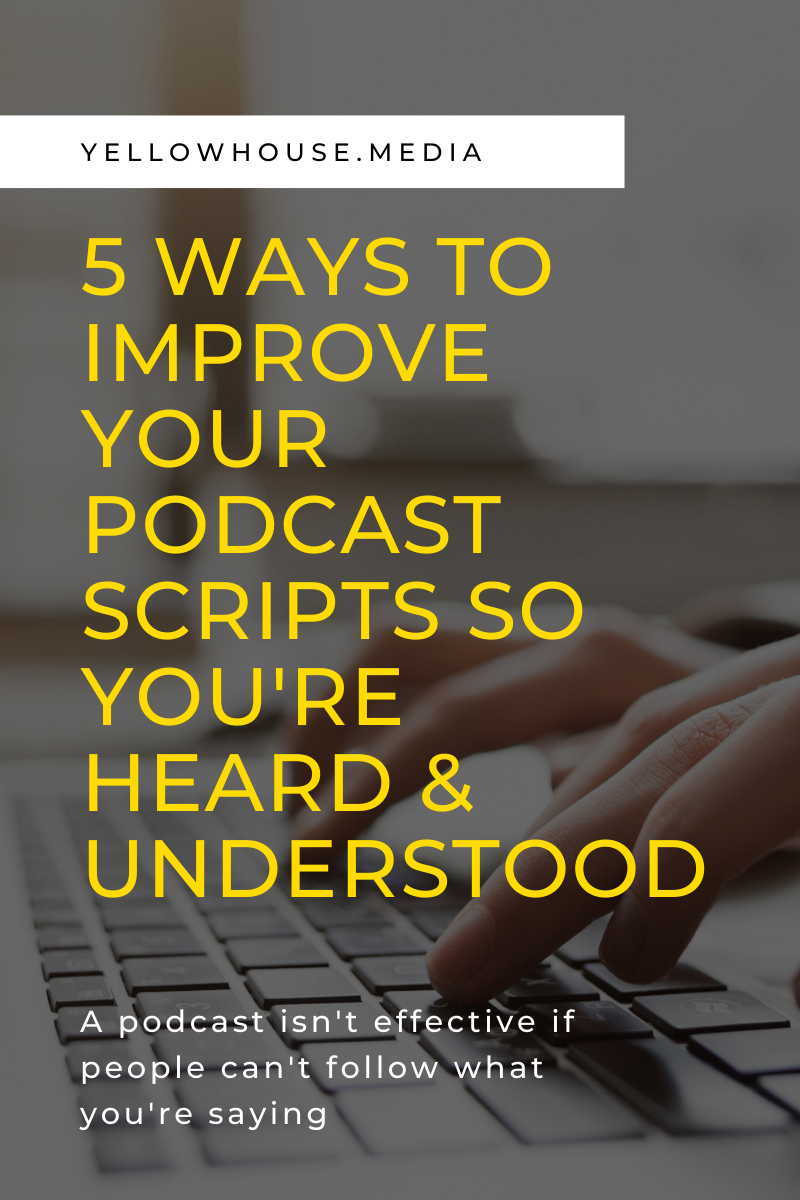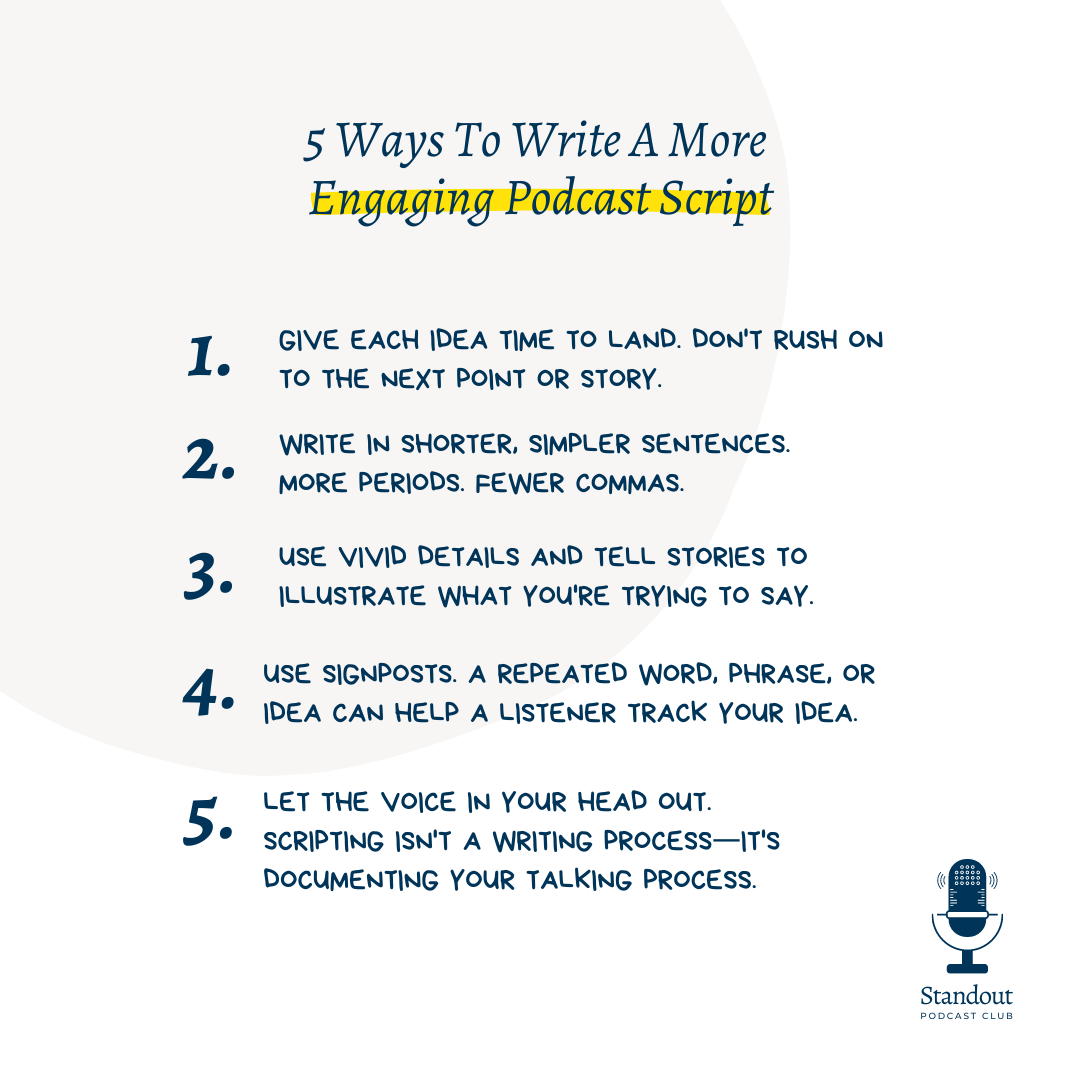5 Ways To Improve Your Podcast Scripts So You're Heard And Understood
Every podcaster wants their ideas and stories to be heard and understood.
We invest a lot of time and energy into our shows and so the thought of listeners hitting the stop button because they can’t follow what we’re saying or lose interest in the ideas we’re sharing is heartbreaking.
But there is a lot we can do to avoid that awful fate.
It starts with a clear content strategy for your podcast.
And then it continues with expertly executed episodes—and those episodes are shaped by the script you write.
Now I know, there is serious debate about whether your show should be scripted or off the cuff.
Here’s another thing I know, most of us are terrible off-the-cuff speakers. I speak for a living and I’m still not a great off-the-cuff speaker.
Scripting takes the best parts of my off-the-cuff thoughts and refines them into something that’s listenable.
Instead of meandering through an idea while I’m speaking extemporaneously, I can take a bit of time to craft the gradual unfurling of an idea. My goal isn’t to sound perfect. It’s certainly not to sound like I’m reading a script. My goal is to be as clearly understood as possible—in, at least, a moderately entertaining way.
Scripting also doesn’t have to take over your podcast.
A scripted intro and outro goes a long way to making your ideas clearer and more easily understood without making your show sound too rehearsed.
Today, I not only write scripts for myself but help our Yellow House Media clients improve their scripts and episode plans. In that process, I’ve gotten to learn exactly what it takes to create a casual and clear script for a podcast.
Here are 5 ways you can improve your podcast scripts so you’re heard, understand, and trusted as a source for great information and ideas.
Give new ideas time to land.
The first thing to remember about writing for audio is that, much more often than not, your listener is doing something else while they listen to your content. You don’t have their full attention.
Even in a gripping story, it’s easy to miss important details or a change of direction.
So as you write your script, you need to give new ideas time to land.
If you’re introducing and explaining a new concept, take more time to explain it than you would if you were writing an article. If you’re introducing a new character in a story or navigating a shift in the action, give it more space than you would if you were telling the story to your friend.
Use examples. Repeat yourself in a couple of different ways. Draw a solid connection between what’s new and what you’ve just been talking about.
You truly might need to write 5 or 6 sentences for audio when 2 or 3 might have sufficed in an article.
In many ways, each of the tips for improving your podcast scripts connects back to giving ideas more time to land.
Write shorter, simpler sentences.
Today’s long-form writing style hinges on really long sentences. We use em dashes, commas, and parentheses to weave multiple ideas and references together into one complex thought.
And while longer sentences might seem like a good way to give ideas more time to land, they do the opposite. Long, complex sentences tend to introduce new information in rapid-fire format without enough space for the listener to integrate that information.
Those trendy long, complex sentences do not translate to audio.
The longer and more complex a sentence is, the more likely you are to lose your listener in the middle of it. With each verbal comma or em dash you introduce, the subject of the sentence gets further and further away from what you’re talking about right now.
That’s not a problem when someone can see the whole sentence and parse how the different phrases go together. But it’s a big problem when someone is trying to track what you’re saying while they dodge traffic on their run or pull together dinner for a family of 5.
When you use shorter, simpler sentences, it’s a lot easier to follow what you’re saying.
Not only do simpler sentences help listeners track what you’re saying, they also introduce more space between ideas because we naturally pause longer between sentences than we do between parenthetical phrases. That means you can stick with a natural spoken cadence but benefit from having ideas introduced more slowly as you read.
Short sentences give ideas time to land.
Think more periods, fewer commas.
Use vivid details.
Stories help ideas stick. Plenty of podcasters use stories to help illustrate an idea they want to explain—but often, their tendency is to rush through the story to get to the part where they explain the idea.
Instead, try spending more time on the story by incorporating vivid details so that, by the time you get to explaining the concept, less explanation is actually needed because the listener has already had an experience of it.
To find the right details to include, start with your 5 senses. What are the tastes, touch, smells, sounds, and sights of the story?
Then, consider the dialogue of the story. What are the characters saying? What are they thinking? Recounting dialogue always makes a story richer.
Each detail you add into a story gives the ideas in that story more time to land.
Use signposts.
When a reader consumes an article, they can literally see a big chunk of the text at once, even if they’re only reading one sentence at a time.
When a listener consumes a podcast, on the other hand, they only have access to the split second they’re hearing in that moment.
Ideally, you’ve followed the tips I’ve already presented and the listener has been doing a good job of tracking what you’re saying and digesting it as it comes. But even still, as soon as they get distracted, they can lose track.
That’s where signposting comes in. Signposting is repeating ideas in a way that helps the listener move through the course of an episode—through transitions, through new information, through the inevitable distractions of modern life.
Need an example? You’re in luck: I’ve signposted this article heavily (even though it’s not always necessary for written text). After introducing the first technique (giving ideas time to land), I’ve referenced back to that technique in each of the other techniques in the article.
If you were listening to this article read aloud, you might not remember every tip I shared—but you would remember that the basis of every tip would be to give new ideas time to land. And you’d end up inferring the other tips over time as you practiced that one main idea.
Which is really just a very roundabout way of giving that single idea time to land. (See what I did there?)
Let the voice in your head out.
Finally, let the voice in your head out.
Stop thinking about scriptwriting as a writing process at all and start thinking of it as a talking process. I don’t necessarily mean that you should abandon the process of writing and switch to transcription (although that can be really helpful for some people).
What I mean is that I find less experienced writers tend to try to translate what’s happening in their heads as they move it into the written word. That might work for articles (emphasis on “might”) but it doesn’t work for audio.
There’s just no need to translate!
What’s happening in your head is much more compelling than a stilted translation of it. We want to hear your voice, your personality, your attitude, your foibles.
The way you think about what you’re communicating helps us to know you better and it helps to give your ideas context.
And, as an added benefit, what’s happening in your head is rarely a quick, buttoned-up version of an idea. It’s a bit redundant. It’s about recursive. It’s awash in detail.
And all of that gives your ideas more time to land.
Yes, you’ll want to clean up your mental chatter. You’ll want to polish it a bit. But more often than not, what’s happening with the voice in your head is more interesting than what’s happening with the words on the page—so err in the direction of sharing your inner monologue more often.
Remember, your podcast can’t make your business money if your listeners aren’t following the ideas and information you’re sharing.
A good script that incorporates these techniques can make you more easily understood—and that significantly strengthens the relationship you have with them.
Power Up Your Podcast Interviews
Now that you’ve learned how to write more effective podcast scripts, it’s time to learn more about crafting stronger interviews. We have 10 powerful questions you can use in your next interview. Click here to get access!



